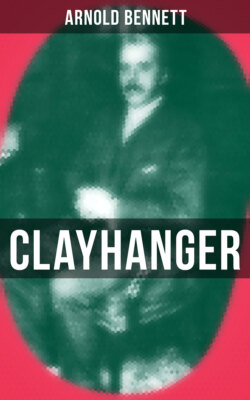Читать книгу CLAYHANGER - Arnold Bennett - Страница 57
На сайте Литреса книга снята с продажи.
Chapter Eleven. Son and Father.
ОглавлениеTable of Contents
Later that evening, Edwin sat at a small deal table in the embrasure of the dormer window of the empty attic next to his bedroom. During the interval between tea and the rendezvous with Big James he had formally planted his flag in that room. He had swept it out with a long-brush, while Clara stood at the door giggling at the spectacle and telling him that he had no right thus to annex territory in the absence of the overlord. He had mounted a pair of steps, and put a lot of lumber through a trap at the head of the stairs into the loft. And he had got a table, a lamp, and a chair. That was all that he needed for the moment. He had gone out to meet Big James with his head quite half-full of this vague attic-project, but the night sights of Bursley, and especially the music at the Dragon, and still more especially the dancing at the Dragon, had almost expelled the attic-project from his head. When he returned unobtrusively into the house and learnt from a disturbed Mrs Nixon, who was sewing in the kitchen, that he was understood to be in his new attic, and that his sisters had gone to bed, the enchantment of the attic had instantly resumed much of its power over him, and he had hurried upstairs fortified with a slice of bread and half a cold sausage. He had eaten the food absently in gulps while staring at the cover of “Cazenove’s Architectural Views of European Capitals,” abstracted from the shop without payment. Then he had pinned part of a sheet of cartridge-paper on an old drawing-board which he possessed, and had sat down. For his purpose the paper ought to have been soaked and stretched on the board with paste, but that would have meant a delay of seven or eight hours, and he was not willing to wait. Though he could not concentrate his mind to begin, his mind could not be reconciled to waiting. So he had decided to draw his picture in pencil outline, and then stretch the paper early on Sunday morning; it would dry during chapel. His new box of paints, a cracked T-square, and some india-rubber also lay on the table.
He had chosen “View of the Cathedral of Notre–Dame Paris, from the Pont des Arts.” It pleased him by the coloration of the old houses in front of Notre–Dame, and the reflections in the water of the Seine, and the elusive blueness of the twin towers amid the pale grey clouds of a Parisian sky. A romantic scene! He wanted to copy it exactly, to recreate it from beginning to end, to feel the thrill of producing each wonderful effect himself. Yet he sat inactive. He sat and vaguely gazed at the slope of Trafalgar Road with its double row of yellow jewels, beautifully ascending in fire to the ridge of the horizon and there losing itself in the deep and solemn purple of the summer night; and he thought how ugly and commonplace all that was, and how different from all that were the noble capitals of Europe. Scarcely a sound came through the open window; song doubtless still gushed forth at the Dragon, and revellers would not for hours awake the street on their way to the exacerbating atmosphere of home.
